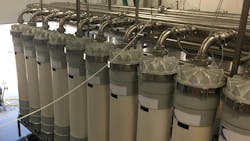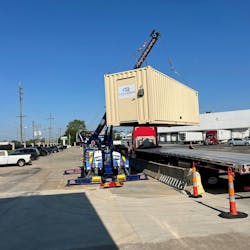Case study: A closer look at advanced wastewater treatment at Shepherd’s Eggs
Egg processing facilities face significant challenges related to wastewater management, particularly when dealing with high levels of biological oxygen demand (BOD) and total suspended solids (TSS). Shepherd’s Eggs, located in Spanish Fork, Utah, processes approximately 800,000 eggs per day. Due to high BOD levels exceeding 20,000 mg/L, the facility faced potential shutdowns caused by odor violations and water contamination linked to large evaporation ponds. Addressing these challenges required an innovative approach that was both cost-effective and environmentally sustainable.
The challenge: Managing high BOD and odor
Egg farms typically generate wastewater containing organic matter, residual proteins, fats and cleaning agents, leading to elevated BOD and TSS levels. Shepherd’s Eggs relied on evaporation ponds to manage wastewater, but these large open areas not only consumed valuable land but also generated persistent odor issues, prompting regulatory pressure from local authorities. Additionally, the use of conventional wastewater treatment methods, such as aeration, proved impractical due to high energy demands, excess real estate and ongoing maintenance costs.
State support for sustainable solutions
Recognizing the environmental and economic challenges faced by Shepherd’s Eggs, the state provided a grant to help offset the cost of implementing an advanced wastewater treatment system. This support enabled the farm to invest in a more sustainable solution without bearing the full financial burden.
Exploring advanced treatment technologies
Following a comprehensive water analysis and a successful pilot trial, Shepherd’s Eggs adopted a cutting-edge approach using Hydro Reserve’s Modified Ultra-Filtration (MUF) technology. MUF is designed to efficiently reduce contaminants while minimizing energy consumption with an automated, non-fouling technology. Unlike traditional aeration, which is energy-intensive, the MUF system uses a physical barrier to remove contaminants with 97.6% efficiency on average.
Key features of the MUF technology include:
- BOD reduction: The system consistently achieves a 99% contaminant reduction, significantly lowering organic load.
- Odor control: By removing organic contaminants, the MUF system eliminates odors commonly associated with egg processing waste.
- Efficient land use: Eliminating the need for evaporation ponds frees up space for alternative agricultural or commercial purposes.
- Energy efficiency: The mechanical filtration process requires less power compared to aeration or traditional biological and membrane filtration.
- Reduced maintenance: Transitioning from daily maintenance routines to quarterly check-ups lowers labor demands and improves system reliability.
Results and long-term impact
Since installation, the MUF system has been in continuous operation for over five years, consistently meeting the facility’s wastewater treatment needs. Key outcomes include:
- Significant BOD reduction: Achieving a 99% decrease in BOD has helped Shepherd’s Eggs comply with environmental regulations and avoid costly penalties.
- Cost savings: The farm saves approximately $500,000 annually by eliminating evaporation ponds and reducing energy usage.
- Odor elimination: Complete odor control enhances community relations and mitigates regulatory concerns.
- Economic benefits from byproducts: Properly processed waste products, such as egg residues, can be repurposed as livestock feed supplements, adding economic value.
Implications for the egg processing industry
As egg production facilities increasingly face stringent wastewater regulations, adopting advanced filtration technologies such as MUF becomes essential. The case of Shepherd’s Eggs highlights the practical advantages of integrating energy-efficient, mechanically-driven wastewater treatment solutions. Facilities can enhance sustainability while optimizing operational efficiency, reducing costs and maintaining compliance.
Conclusion
Hydro Reserve’s MUF technology demonstrates the potential for sustainable wastewater management in the egg processing sector. By addressing both environmental and operational challenges, facilities such as Shepherd’s Eggs can maintain productivity while minimizing their ecological footprint. As the poultry industry evolves, leveraging innovative wastewater treatment methods will be crucial for long-term success.
About the Author
Craig Koch
VP of Engineering at Hydro Reserve
A seasoned expert in ultra-filtration and wastewater treatment, Craig Koch brings over 30 years of experience in the water industry. His background includes leadership roles at industry leaders such as Culligan, 3M Water and Membrana, where he specialized in advanced filtration technologies and system innovation.

